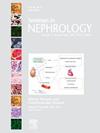与血液透析有关的肝素免疫效应:关注肝素诱发的血小板减少症。
IF 2.8
3区 医学
Q2 UROLOGY & NEPHROLOGY
引用次数: 0
摘要
间歇性血液透析(HD)几乎无一例外地使用肝素,因此,HD 患者有可能患上肝素诱导的血小板减少症(HIT),这种免疫介导的不良反应是由抗血小板因子 4/肝素 IgG 引起的,它会强烈激活血小板。HIT 患者会出现高凝状态,大大增加静脉和动脉血栓形成的风险。血液透析患者更容易出现某些与 HIT 相关的并发症,包括使用肝素后仍出现的血液滤器血栓形成、血管内导管和/或动静脉瘘相关血栓形成、肝素栓剂注射后过敏性反应、血栓性中风和急性肢体动脉血栓形成(反映出许多肾功能衰竭患者存在高频率的潜在动脉病变)。处理 HD 中的 HIT 通常需要使用替代(非肝素)抗凝剂,例如达那帕罗钠(美国以外)或阿加曲班(美国和其他国家)。肝素移植血液透析器(无全身肝素)能否安全用于急性 HIT 尚不清楚。HIT 免疫反应具有明显的短暂性,通常不会因后续肝素给药而再次触发。因此,由于肾衰竭患者通常需要长期进行血液透析,因此在血清转换(血小板激活型 HIT 抗体消失)后可能有机会重新开始使用肝素进行血液透析,而这种做法再次引发 HIT 的可能性似乎很低。本文章由计算机程序翻译,如有差异,请以英文原文为准。
Immunologic Effects of Heparin Associated With Hemodialysis: Focus on Heparin-Induced Thrombocytopenia
Intermittent hemodialysis (HD) is almost invariably performed with heparin, and thus HD patients are at risk of developing the immune-mediated adverse effect heparin-induced thrombocytopenia (HIT), caused by anti-platelet factor 4/heparin IgG, which strongly activates platelets. HIT patients develop hypercoagulability with greatly increased risk of thrombosis, both venous and arterial. Certain HIT-associated complications are more likely to develop among HD patients, including hemofilter thrombosis despite heparin, intravascular catheter and/or arteriovenous fistula-associated thrombosis, post-heparin bolus anaphylactoid/anaphylactic reactions, and thrombotic stroke and acute limb artery thrombosis (reflecting the high frequency of underlying arteriopathy in many patients with renal failure). Management of HIT in HD usually requires use of an alternative (non-heparin) anticoagulant; for example, danaparoid sodium (outside the USA) or argatroban (USA and elsewhere). Whether heparin-grafted hemodialyzers (without systemic heparin) can be used safely in acute HIT is unknown. The HIT immune response is remarkably transient and usually not retriggered by subsequent heparin administration. Accordingly, since renal failure patients often require long-term HD, there may be the opportunity—following seroreversion (loss of platelet-activating HIT antibodies)—to restart heparin for HD, a practice that appears to have a low likelihood of retriggering HIT.
求助全文
通过发布文献求助,成功后即可免费获取论文全文。
去求助
来源期刊

Seminars in nephrology
医学-泌尿学与肾脏学
CiteScore
5.60
自引率
0.00%
发文量
27
审稿时长
6-12 weeks
期刊介绍:
Seminars in Nephrology is a timely source for the publication of new concepts and research findings relevant to the clinical practice of nephrology. Each issue is an organized compendium of practical information that serves as a lasting reference for nephrologists, internists and physicians in training.
 求助内容:
求助内容: 应助结果提醒方式:
应助结果提醒方式:


